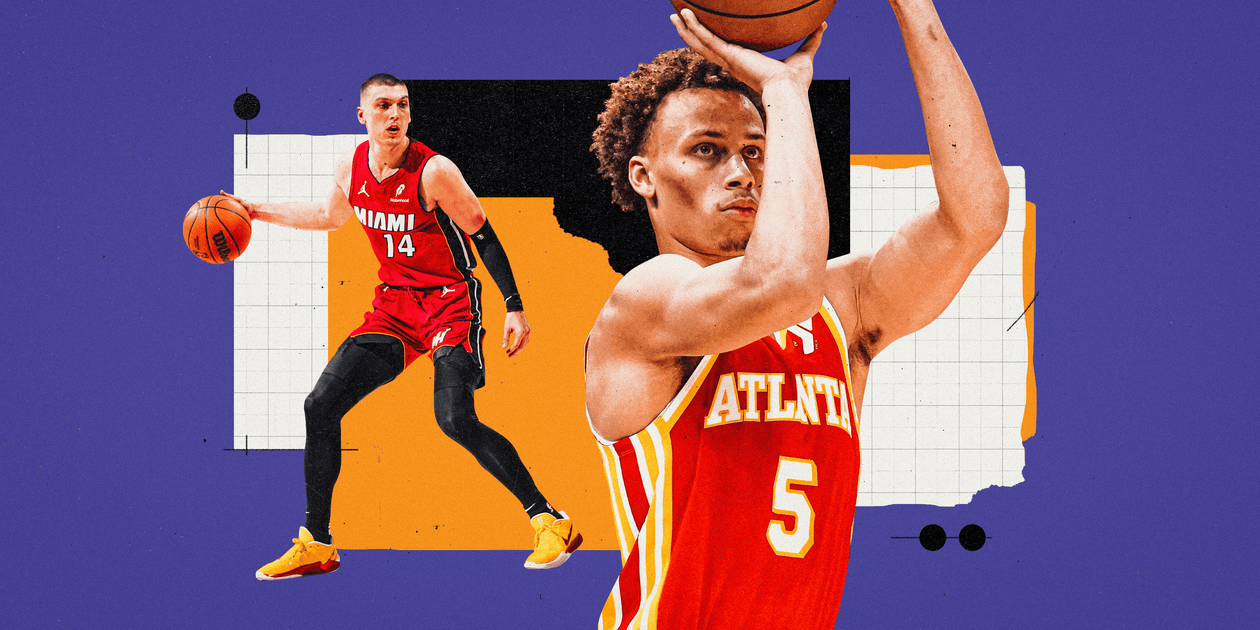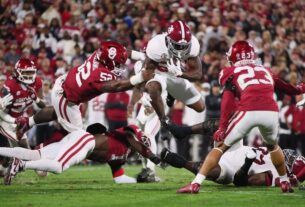Dyson Daniels went 3 of 16 against the New York Knicks last week. It was amazing.
Let me explain.
First, it was a career-high in shot attempts. Second, he took the 16th even after making just three of his first 15. And he did it with a minute left in a one-point game.
That shot missed, too, but that’s hardly the point. After two seasons in New Orleans, Daniels’ rep upon arriving in Atlanta this summer was that his confidence came and went, and if he missed a few shots, he’d start pulling the ball down and pass up shots entirely. Despite flashing amazing defensive talent, his inability to be a consistent threat on the offense was keeping him off the court.
It wasn’t just that he was shooting 31 percent from 3; it was that his microscopic 12 percent usage rate meant defenses could disregard him entirely. So far, in Atlanta, things are very different. Daniels took the rock with 70 seconds left against New York and made a hard, downhill drive for a pull-up floater that missed. Three makes on 16 attempts. And it didn’t stop him.
Daniels set another career high the next night by shooting 17 times. Two games later, he took 21 shots, scoring a career-high 28 points in Atlanta’s Trae Young-less upset of world champion Boston on the Celtics’ home court.
Daniels’ defense has drawn all the attention in the early season, and deservedly so. But the underrated part of his breakout season has been the confidence he’s played with on offense, shrugging off misses and coming back to let it rip on the next trip. The record scratches from New Orleans are a thing of the past.
Hawks coach Quin Snyder talked about this topic and how it applied to Daniels before the season. It’s worked out almost exactly as he said then.
“I think a lot of it is situational,” Snyder said. “Usually guys are more confident when they can anticipate that they’re going to have a shot. If you get the ball and then you want to decide, (in) that moment, your conscious mind takes you out of rhythm. Especially for younger guys, if they’re concerned about whether the ball is going to go in or not, that’s not the best thing. It’s more than a green light. It’s understanding situational shooting, knowing that it’s not only a green light but you have to take that shot. It’s important for you to shoot that whether you make or miss.”
Snyder has seen a version of this movie before, coincidentally, with another young Australian who was reluctant to shoot. He had Joe Ingles in Utah when Ingles was a gun-shy rookie; Ingles didn’t shoot more than five times until the 15th game of the season and finished with a 12.9 usage rate. Three years later, he launched 464 3s for a team that went to the second round of the playoffs.
Ingles saw all the flashes from Daniels this summer with the Australian national team when both were preparing for the Olympics. It’s no surprise to him that Daniels is thriving under Snyder.
“The last few summers, we would see the talent, the IQ, the defensive ability and all those different things,” Ingles said. “Then this summer he played a lot (in the Olympics), guarded the best player every time, and offensively would show the poise and playmaking. I was really impressed. And he’s a really good kid who works his ass off.
“Knowing Quin, he will unlock some offensive ability and potential, for sure. He did it with me, he’s done it with a lot of the players I’ve been around. He makes you want to run through a wall for him. For me, coming over (to the NBA) at 27 and doing what he was able to do with me, he was a huge part of that, and I think he’ll give that to Dyson.”
We should talk about the defense too. Daniels has been a terror on that end, leading the league in deflections and steals by staggering margins while adding size and physicality on the wing at 6-foot-8. To put in perspective just how much of a pest he’s been, Alex Caruso led the league last year with 3.7 deflections per game. Daniels is averaging 7.6.
Go through the clips of all his thievery and you’ll see he’s earned his steals in an impressive variety of ways — overplaying passing lanes, deflecting his own man’s passes with “high hands” and using a karate-chop strip move, for instance.
He’s also straight-up embarrassed a few guys by picking their dribble at midcourt. Like this:
Daniels has 23 steals in his last four games; only three other players have that many all season. Suffice to say Atlanta has never had a wing defender like this before, and while it hasn’t impacted the overall results on that end (the Hawks, as ever, are 26th in defense), the team’s stats are much better in Daniels’ on-court minutes, even though most of them are shared with Young.
More importantly, Daniels has also warmed up to the “Great Barrier Thief” nickname recently. We need to make this stick, people!
As long as Daniels keeps letting it rip with confidence on the offensive end, the Hawks can benefit from his awesome turnover creation on defense. He has a great shot of being named to the All-Defense team and will likely be a strong contender for Most Improved Player, too, making him arguably the most significant emerging player from the season’s opening weeks.
Daniels is the most important one, but here are nine other names you need to know from the season’s first few weeks:
Wahoowa! While several Memphis players warrant mentioning here as the back half of the roster has helped keep the Grizzlies afloat amid myriad injuries, Huff stands out. A lightly regarded two-way signing before the season, he’s already gained a promotion to the main roster following a series of eruptions off the bench, even earning a start in Wednesday’s game against the Los Angeles Lakers.
Huff isn’t a post threat, but he makes an offensive impact in two entirely different ways. First, he’s a rim-runner who gets out in transition and can finish lobs, specializing in reverse dunks like in the clip below.
JAY HUFF SIGNATURE REVERSE SLAM pic.twitter.com/Z0r31y5x1s
— eric (@EricTweetsNBA) November 14, 2024
However, he also doubles as a half-court 3-point threat, having made 43.8 percent from distance so far this year. Huff gets them up, too, jacking 48 attempts in his 185 minutes. The 7-foot-1 center also offers rim protection, with a stellar 11.6 percent block rate and, notably, a dramatically reduced foul rate from his previous stops in the NBA.
That package has proven especially effective on an up-tempo Memphis team that has leaned into its depth and pace to stay afloat. At age 26 and on his fourth team, Huff looks like a keeper as a backup center and is under contract for three years beyond this one.
Wahoowa! (This won’t be all Virginia guys, I promise.) You could pick multiple names from this Cavs squad rampaging through the schedule; Caris LeVert also has been a monster, most notably.
But for sheer out of nowhere-ness, we have to go with Jerome, who signed a minimum deal in Cleveland two summers ago and then missed all of last season after ankle surgery. I’m not sure what the Cavs’ hopes were for him this season, but I suspect “leading an undefeated team in PER” would be at the high end. Jerome is in his sixth season and has never played more than 48 games or 816 minutes in any of them, but that’s about to change dramatically.
One of the keys has been a deadly floater game; more than half his 2s have come between 3 and 16 feet, per Basketball-Reference.com, and he’s made nearly two-thirds of them. Add in an accurate 3-point shot (a scalding 57.7 percent so far) and top-notch reads as a passer (more than three dimes for every turnover), and he’s been a massive plus captaining the Cavs’ second unit.
Perhaps more shocking than the offensive output has been Jerome’s impact defensively. Despite his notorious slowness afoot, he’s pilfered 18 steals in just 211 minutes. That’s the league’s third-highest theft rate among players with at least 200 minutes, trailing only Daniels and Caruso.
I ran into a front-office executive at the Champions Classic who witnessed Powell’s 29-point second-half eruption in Oklahoma City on Monday, and he riddled me with this question: If they selected the teams today, would Powell make the Western Conference All-Star team?
Nooooorm has been that good, averaging 24.9 points per game with 50/49/83 shooting splits to help keep a limited Clippers offense functioning. In particular, he’s been devastating walking into 3s off the dribble.
Norman Powell stock continues to rise 📈
He helps lead the Clippers to a W with 31 points & 12 rebounds 🔥 pic.twitter.com/cOWo7n5bfC
— NBA TV (@NBATV) November 9, 2024
Never mind that he’s 31 and in his 10th season; Powell is having a career year and has been the Clippers’ go-to guy at times, with a 26.6 usage rate that nearly rivals teammate James Harden’s. And it’s not just the scoring: Powell is posting a career high assist percentage and has a steal in nine straight games.
Forgotten as the Pacers made an Eastern Conference finals run while he sat out injured last spring, the 2022 lottery pick has come back with a vengeance.
I was fortunate enough to be in Indy to witness Mathurin’s origin story, so to speak, when he replaced an injured Andrew Nembhard against the Celtics and finished with 30 points in a surprise win. While the Pacers’ offense has otherwise remained shockingly anemic in the early going, Mathurin has been a revelation. He’s averaged 24.0 points per game over his last seven contests while starting the most recent six.
An electric downhill driver, especially going left, Mathurin draws fouls for sport (10.1 free-throw attempts per 100 possessions), but he’s not just trying to scam trips to the line. He also has an accurate long-range game (46.5 percent on 3s thus far) to keep defenses honest and has enough pull-up game to be a true three-level threat.
Bennedict Mathurin helps us get within four late in the fourth quarter. he’s up to 23 points and 11 rebounds. pic.twitter.com/0y4tmDcD2i
— Indiana Pacers (@Pacers) November 14, 2024
The 6-6 guard also leads the team in rebounding, which is a wee bit of an indictment of the Pacers’ frontcourt, but a 12.3 percent rebound rate from a perimeter player is impressive on any level.
Nit-pickers will note Mathurin still has his shortcomings, being prone to ball-stopping, dribble blindness and periodic defensive lapses, but if he keeps scoring this efficiently and this often, it’s easy to look past those warts. Mathurin has been Indy’s best player in the early going, and one presumes he won’t be coming off the bench when Nembhard returns.
Guess who leads Golden State in 3-point attempt rate? I’ll give you a hint: It’s not Stephen Curry. Hield not only has the highest rate of attempts on the Warriors, but also leads the entire NBA in made 3s per 100 possessions with 7.5.
After being an afterthought in the Philadelphia 76ers’ offense late last season, Hield has been a prolific and accurate launcher for the Warriors, playing some of the best basketball of his career at 31. Nobody will complain as long as he’s making 46.7 percent of his 3s, which he’s done so far, in addition to knocking down 54.9 percent of his 2s. For good measure, he’s setting a career high in rebound rate too.
Hield is only playing 24.5 minutes a night in the Warriors’ egalitarian system, but he’s second on the team in scoring and PER and a big reason Golden State ranks third in the NBA in offensive efficiency — the Warriors were eighth each of the last two seasons. On the first season of a four-year deal that pays him an average of $9.4 million, he’s been one of the best signings of the 2024 offseason.
After missing most of last season because of a stress reaction and other issues, Eason has roared back to be arguably Houston’s most effective player in the first dozen games. Coming off the bench, he’s energized a Rockets second unit that has helped overcome blah output from the starting group en route to an 8-4 start. Units featuring Eason and partner in chaos Amen Thompson have outscored opponents by 17.6 points per 100 possessions so far, with a sterling 100.2 defensive rating.
What’s notable is that Eason is a more efficient version of his usual mayhem, shooting 62.8 percent on 2s after making fewer than half across his first two seasons. He’s doing it by getting all the way to the rim and finishing; watch here, for instance, as he sizes up Nic Batum and puts him on a poster Wednesday.
Tari Eason shows his athleticism with this one handed dunk to walk away with the Dunk of the Night. #NBAAfrica pic.twitter.com/Z1VptEMoIt
— NBA Africa (@NBA_Africa) November 14, 2024
Eason’s play, along with that of Thompson, could eventually force the Rockets into some difficult decisions on lineups and salaries. The two have been dramatically more effective than Houston’s starters, and Eason will be up for a contract extension after the season. For now, however, let’s enjoy the show.
Agbaji’s jump shot has always looked like a thing of beauty in pregame warm-ups, but in his third season, it’s finally translating to games. After making just 34.6 percent from 3 in his first two seasons in Utah and underwhelming in a late-season cameo after the trade deadline, he’s emerged as a solid starter in Toronto by knocking down 47.9 percent from distance in the early part of the season.
Accuracy is paramount for Agbaji since he’ll never be a high-usage player, but he’s also made an impact inside the arc by focusing more on transition and rim attempts and ditching the other stuff. He’s only taken two shots between 10 feet and the 3-point line all season but is shooting 64.4 percent at the rim.
On the third year of his rookie deal, Agbaji establishing himself as a 3-and-D guy would go a long way toward getting his deal extended this summer. His emergence has been much needed on a paper-thin Raptors roster reeling from other injuries at the wing.
While the rest of the Bucks’ bench has been a wasteland, Green has delivered in his role in the most pickup-legend way possible: by never taking a 2-point shot. His 53 3-point attempts without a 2 to start the season is an NBA record, (sorry, Garrison Mathews), one that finally came to an end when he missed a paint attempt Wednesday against Detroit.
Watching Green shoot, it’s hard to believe he’s so accurate. The undrafted guard from Northern Iowa tucks the ball all the way behind his head and then lets it rip, but the results speak for themselves. He shot 42.6 percent from 3 in the G League in 2022-23 and is at 42.7 percent for his NBA career to go with 92 percent from the line (he shot 90 percent in four college seasons). With a 50 percent mark from 3 this season on a team otherwise short on floor-spacing options, Green has established himself as an important piece as Milwaukee tries to recover from a woeful start.
He’s also important on another level — as a cost-controlled piece on a minimum deal for another season, something the tax-constrained Bucks desperately need on their books.
Lost in the insanity of Miami’s bizarre loss to Detroit on Tuesday was the play of Herro in nearly leading the Heat to an impossible comeback. Down nine in the final 90 seconds of regulation, he made three straight 3-pointers to send it to overtime, part of a 40-point eruption that included 10 made 3s.
That wasn’t an outlier, either. Through 10 games, Herro has been Miami’s best player, averaging 24.9 points on breathtaking shooting splits: 54.7 percent on 2s and 47.9 percent on nearly 10 3-point attempts a game. That adds up to scalding 66.8 true shooting percentage, a notable change for a player who historically has been middle of the pack on this measure.
In a related story, Herro has basically excised the long 2 from his shot diet. He took more than a quarter of his shots between 10 feet and the 3-point line in 2023-24; this season, that’s only 7 percent of his output, according to Basketball-Reference.com.
Here’s one middie he did make, though, a difficult leaner with 1.8 seconds left in overtime to tie the score Tuesday … a play forgotten in the craziness that happened immediately after.
Sign up to get The Bounce, the essential NBA newsletter from Zach Harper and The Athletic staff, delivered free to your inbox.
(Illustration: Dan Goldfarb/ The Athletic; Photos: Bart Young, Eric Espada / NBAE via Getty Images)





